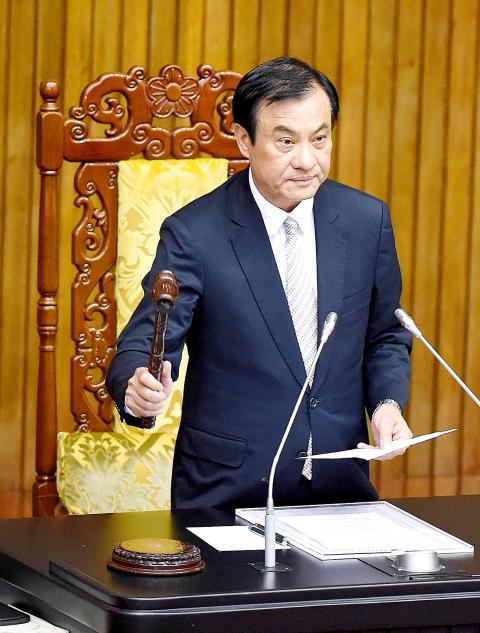Amendments to the National Security Act (國家安全法) that impose higher sentences and fines on people spying for China or other nations, and increase restrictions on retired officials visiting China were yesterday passed by the legislature.
Those found recruiting others in Taiwan under instructions from the Chinese government would be subject to at least seven years in prison and a fine of up to NT$100 million (US$3.19 million) under the amendments.
Those conducting espionage by using the Internet would also be subject to the new penalties.

Photo: Chu Pei-hsiung, Taipei Times
People employed by the military, the civil service, state-run enterprises or public-school teachers who are convicted for contravening the act would lose their pension, while those who have already retired and have received pension benefits would be required to return all the funds paid up to the date of their conviction.
Supplementary resolutions on the issues of how to define China, Macau and Hong Kong within the rubric of “hostile foreign forces,” and how to determine whether disseminated communications from people from those regions or other nations constitute a national threat are to be determined during the next legislative session, the Democratic Progressive Party and New Power Party caucuses said.
Those issues would be addressed through amendments to the Act Governing Relations Between the People of the Taiwan Area and the Mainland Area (臺灣地區與大陸地區人民關係條例), as well as the relevant communications laws, they said.
Legislative Speaker Su Jia-chyuan (蘇嘉全) yesterday morning called a cross-caucus meeting to discuss amendments to Articles 2-1 and 5-1, and the additions of Articles 2-2 and 5-2 to the National Security Act.
The biggest developments that came out of the three-hour meeting were the increase in fines and imprison sentences specified in Article 5-1 and the way China, which is considered the greatest threat to national security, is defined in Article 2-1, legislators said.
The amended law would target those found establishing, financially supporting or directing organizations for the interests of a foreign power, they said.
It would also target those found probing, leaking or transmitting documents, images, electronic files or other items related to national security, they added.
Those found guilty of the above offenses specifically to help the Chinese government would face a minimum of seven years in prison and a fine of between NT$50 million and NT$100 million, while those guilty of helping the governments of other nations would by subject to between three and 10 years in prison and a maximum fine of NT$30 million, they said, adding that attempted offenses would also be punishable under the amended act.
Those who admit to committing the offenses would receive lighter sentences or exemptions, they said.
All proceeds paid to collaborators by foreign governments would be confiscated, they said.

INVESTIGATION: The case is the latest instance of a DPP figure being implicated in an espionage network accused of allegedly leaking information to Chinese intelligence Democratic Progressive Party (DPP) member Ho Jen-chieh (何仁傑) was detained and held incommunicado yesterday on suspicion of spying for China during his tenure as assistant to then-minister of foreign affairs Joseph Wu (吳釗燮). The Taipei District Prosecutors’ Office said Ho was implicated during its investigation into alleged spying activities by former Presidential Office consultant Wu Shang-yu (吳尚雨). Prosecutors said there is reason to believe Ho breached the National Security Act (國家安全法) by leaking classified Ministry of Foreign Affairs information to Chinese intelligence. Following interrogation, prosecutors petitioned the Taipei District Court to detain Ho, citing concerns over potential collusion or tampering of evidence. The

‘FORM OF PROTEST’: The German Institute Taipei said it was ‘shocked’ to see Nazi symbolism used in connection with political aims as it condemned the incident Sung Chien-liang (宋建樑), who led efforts to recall Democratic Progressive Party (DPP) Legislator Lee Kun-cheng (李坤城), was released on bail of NT$80,000 yesterday amid an outcry over a Nazi armband he wore to questioning the night before. Sung arrived at the New Taipei City District Prosecutors’ Office for questioning in a recall petition forgery case on Tuesday night wearing a red armband bearing a swastika, carrying a copy of Adolf Hitler’s Mein Kampf and giving a Nazi salute. Sung left the building at 1:15am without the armband and apparently covering the book with a coat. This is a serious international scandal and Chinese

Seventy percent of middle and elementary schools now conduct English classes entirely in English, the Ministry of Education said, as it encourages schools nationwide to adopt this practice Minister of Education (MOE) Cheng Ying-yao (鄭英耀) is scheduled to present a report on the government’s bilingual education policy to the Legislative Yuan’s Education and Culture Committee today. The report would outline strategies aimed at expanding access to education, reducing regional disparities and improving talent cultivation. Implementation of bilingual education policies has varied across local governments, occasionally drawing public criticism. For example, some schools have required teachers of non-English subjects to pass English proficiency

TRADE: The premier pledged safeguards on ‘Made in Taiwan’ labeling, anti-dumping measures and stricter export controls to strengthen its position in trade talks Products labeled “made in Taiwan” must be genuinely made in Taiwan, Premier Cho Jung-tai (卓榮泰) said yesterday, vowing to enforce strict safeguards against “origin laundering” and initiate anti-dumping investigations to prevent China dumping its products in Taiwan. Cho made the remarks in a discussion session with representatives from industries in Kaohsiung. In response to the US government’s recent announcement of “reciprocal” tariffs on its trading partners, President William Lai (賴清德) and Cho last week began a series of consultations with industry leaders nationwide to gather feedback and address concerns. Taiwanese and US officials held a videoconference on Friday evening to discuss the